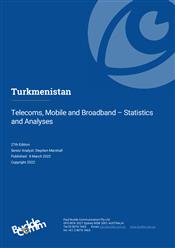Turkmenistan Telecoms Market Report
Telecoms, Mobile and Broadband - Statistics and Analyses

Publication Date: April 2024
Report Pages: 75
Analyst: Sebastien De Rosbo
Early presidential elections in Turkmenistan raise slight hopes of telecom sector reform
The hermit nation of Turkmenistan, which rivals only North Korea for its isolationism, continues to keep its telecom sector – along with the broader populace – under tight control.
The country inched up just one point off the bottom of the world rankings for press and internet freedom in the most recent report from Reporters Without Borders. Most social networks in the country are blocked, although locals do have access to the government-developed Biz Byarde (We Are Here) platform released in 2019. All internet users, however, need to identify themselves before logging on, and strict censorship over what can be viewed is in force. The end result is that Turkmenistan has one of the lowest penetration rates for internet access in the world.
The President of the republic, Gurbanguly Berdimuhamedow, announced early presidential elections for mid-March 2022. There is, therefore, some prospect – admittedly very slim – of a loosening of restrictions on the country’s telecom sector following regime change. But with the President’s son already widely tapped to be the successor, there seems little chance of Turkmenistan moving far away from the bottom of the world’s Telecom Maturity Index any time soon.
This report includes the most recently published government and ITU data on Turkmenistan’s telecom sector, Telecom Maturity Index charts and analyses, assessment of the global impact of Covid-19 on the telecoms sector, and other recent market developments.
Key developments:
- Presidential elections announced for March 2022 bring with them some hope of telecom sector reform.
- Internet access and broadband penetration rates in Turkmenistan remain among the lowest in the world.
Key companies mentioned in this report:
- Turkmentelecom, TM Cell (Altyn Asyr), Asgabat Säher Telefon Ulgamy (ASTU), MTS Turkmenistan.
Related Reports
- 2019 Asia - Mobile Network Operators and MVNOs
- 2019 Asia - Fixed Broadband Market - Statistics and Analyses
- 2019 Asia - Mobile Infrastructure and Mobile Broadband
- Bhutan - Telecoms, Mobile and Broadband - Statistics and Analyses
- India - Telecoms, Mobile and Broadband - Statistics and Analyses
- Indonesia - Telecoms, Mobile and Broadband - Statistics and Analyses
- Malaysia - Telecoms, Mobile and Broadband - Statistics and Analyses
- Georgia - Telecoms, Mobile and Broadband - Statistics and Analyses
- Hong Kong - Telecoms, Mobile and Broadband - Statistics and Analyses
- Pakistan - Telecoms, Mobile and Broadband - Statistics and Analyses
Share this Report
TMT Intelligence
A platform to scale your intelligence tasks
Monitor critical insights with our AI-powered Market Intelligence Platform gathering and analyzing intelligence in real time. With AI trained to spot emerging trends and detect new strategic opportunities, our clients use TMT Intelligence to accelerate their growth.
If you want to know more about it, please see:
Research Methodology
BuddeComm's strategic business reports contain a combination of both primary and secondary research statistics, analyses written by our senior analysts supported by a network of experts, industry contacts and researchers from around the world as well as our own scenario forecasts.
For more details, please see:
More than 4,000 customers from 140 countries utilise BuddeComm Research
Are you interested in BuddeComm's Custom Research Service?
Hot Topics
News & Views
Have the latest telecommunications industry news delivered to your inbox by subscribing to BuddeComm's weekly newsletter.